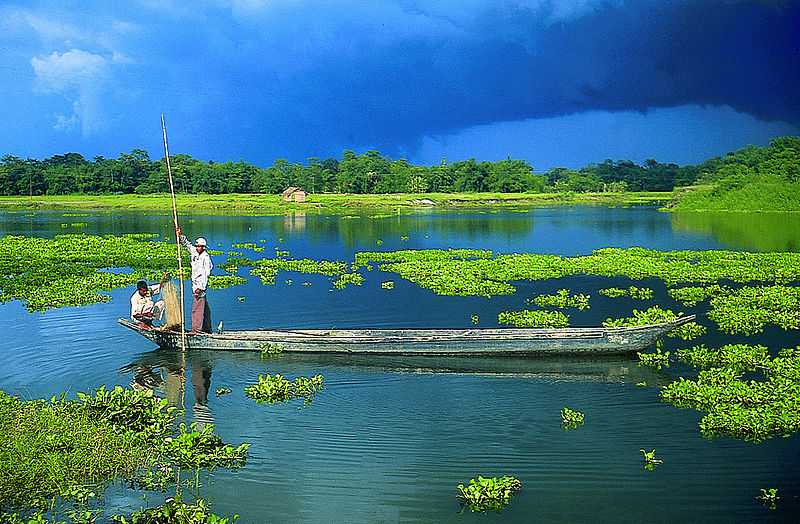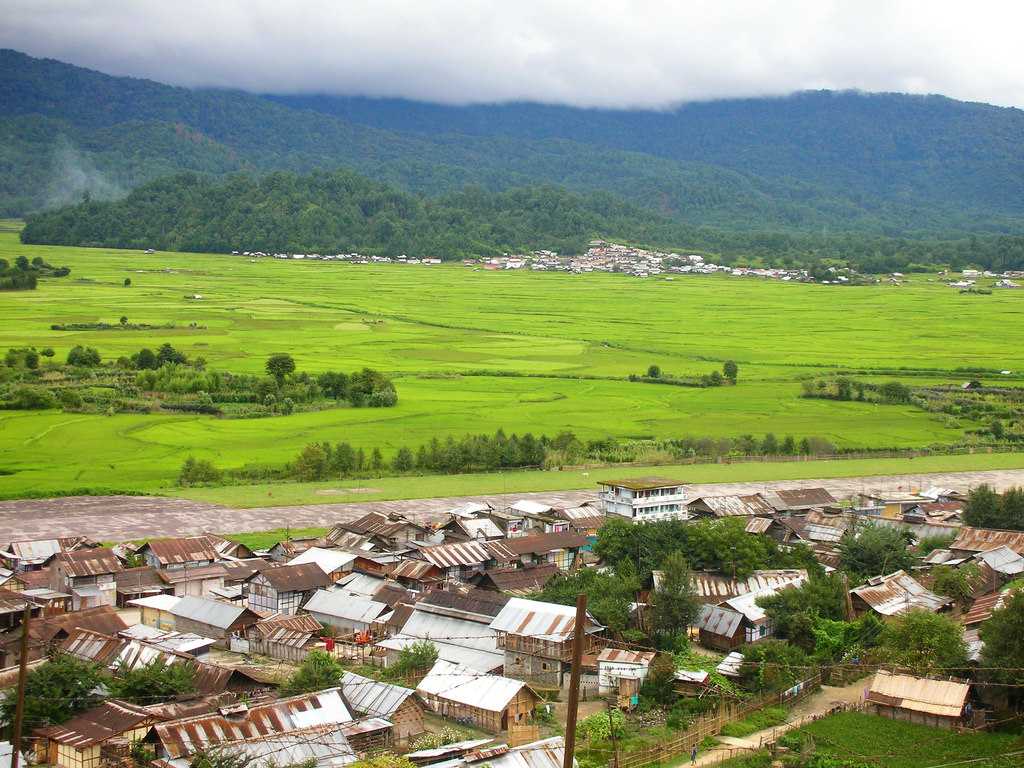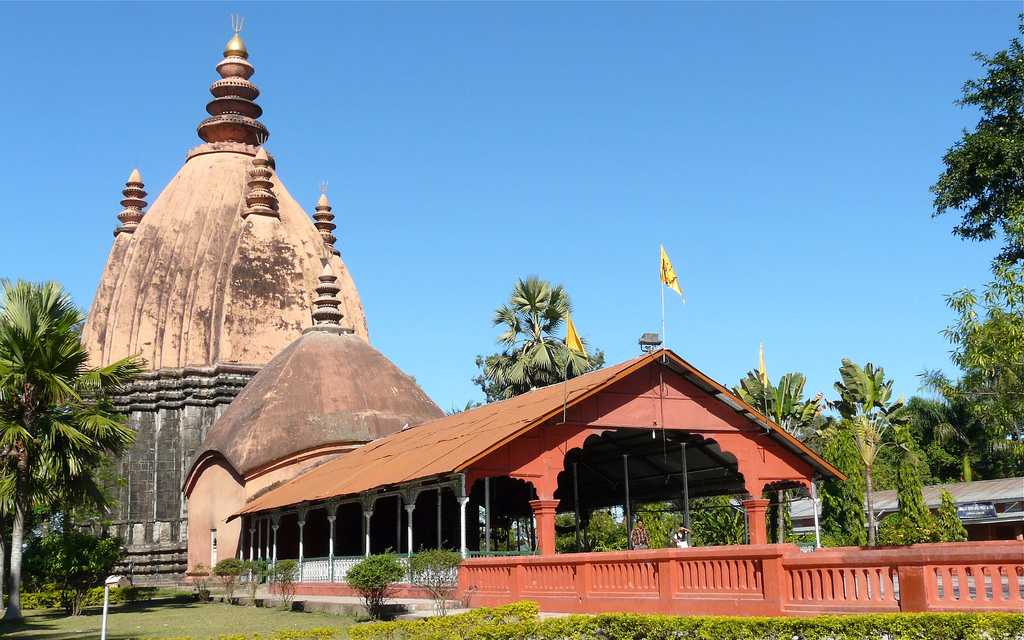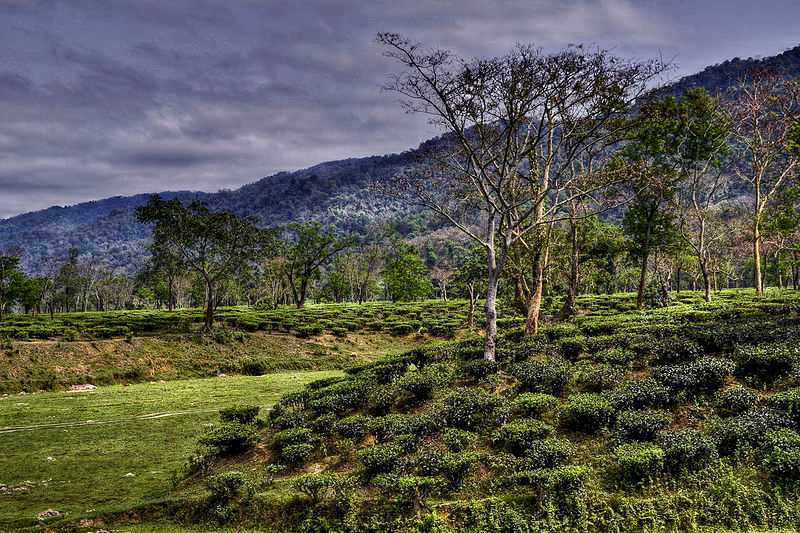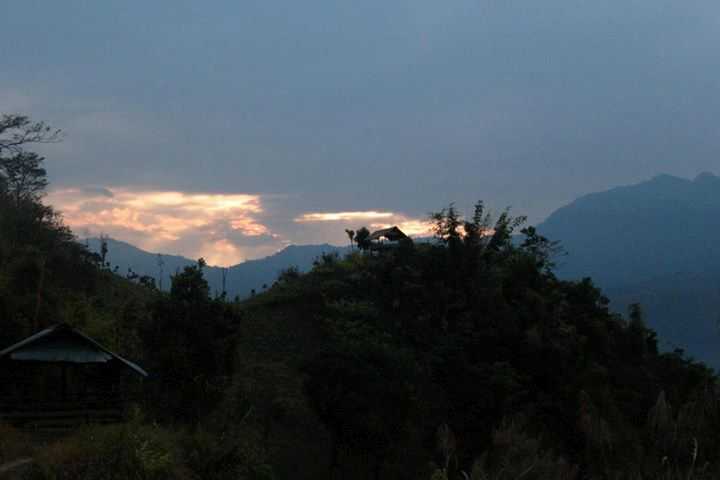LILABARI
Are you tired of the same old tourist destinations? Looking for a place that's off the beaten path but still has plenty to offer? Look no further than Lilabari! This charming town in Assam, India is a hidden gem that's just waiting to be discovered.
If you're a fan of natural beauty, then you'll love Lilabari. The town is situated on the banks of the Brahmaputra River, and it's surrounded by lush green forests and rolling hills. It's the perfect place to escape from the hustle and bustle of city life and reconnect with nature.
But that's not all Lilabari has to offer. The town is also home to some unique cultural experiences. One must visit Bihu celebrations or try out traditional Assamese cuisine at Brahmaputra Dhaba. And let's not forget about the famous Aerodrome which attracts aviation enthusiasts from across the country.
If you're looking for adventure, then Lilabari won't disappoint. You can go trekking in the nearby hills, take a boat ride down the Brahmaputra River, or even try your hand at fishing. There's something for everyone in this little town.
So what are you waiting for? Pack your bags and head to Lilabari today! It may be small, but it's full of surprises and unforgettable experiences. And who knows – you might just fall in love with this charming little town like so many others have before you!
Table of Contents
- Introduction
- History and Culture of Lilabari
- How to Reach and getting around Lilabari
- Weather of Lilabari
- Places to Visit in Lilabari
- Food Options and Local Cuisine of Lilabari
- Best areas for Accommodation in Lilabari
- Shopping in Lilabari
- Nightlife in Lilabari
- Festivals and Events in Lilabari
- Tips for Travelers travelling to Lilabari
- FAQs
History and Culture of Lilabari
Lilabari is a small town located in the Lakhimpur district of Assam, India. The town is known for its rich history and vibrant culture. The name Lilabari comes from two words, Lila meaning play and Bari meaning house. According to legend, the town was named after Lord Krishna's playful activities in the area.
The town has a mix of people from different communities and religions, including Hindus, Muslims, and Christians. This diversity is reflected in the various festivals celebrated in Lilabari throughout the year. The most famous festival is Bihu, which is celebrated with great enthusiasm by all communities.
The history of Lilabari dates back to the pre-independence era when it was a strategic location for British troops. After independence, Lilabari became an important centre for tea plantations and agriculture. Today, it is a growing tourist destination with attractions like the Brahmaputra river, Subansiri river, and wildlife sanctuaries.
One interesting fact about Lilabari is that it has its own unique dialect of Assamese called "Lilabariya". The dialect has its own distinct words and pronunciation that are not found anywhere else in Assam.
In conclusion, Lilabari is a charming town with a rich history and culture. Its diverse population and unique dialect make it a fascinating place to visit for anyone interested in experiencing authentic Assamese culture.
How to Reach and getting around Lilabari
By Air: Lilabari Airport is situated in the North Lakhimpur district of Assam. It is well-connected to major cities like Guwahati, Kolkata, and Delhi. From the airport, you can take a taxi or hire a private car to reach your destination. The airport is located about 5 km from the city center.
By Train: The nearest railway station to Lilabari is located in North Lakhimpur, which is about 4 km away. The station is well-connected to major cities like Guwahati, Kolkata, and Delhi. You can take a taxi or auto-rickshaw from the railway station to reach Lilabari.
By Road: Lilabari is well-connected by road with major cities in Assam and other states of India. National Highway 15 connects it with Guwahati, Tezpur, and other cities in Assam. You can also take a bus from nearby cities like North Lakhimpur or Dibrugarh to reach Lilabari.
By Waterways: Brahmaputra River runs through Lilabari, making it accessible through waterways as well. You can take a ferry or boat ride from nearby cities like Dibrugarh or Guwahati to reach Lilabari. The scenic beauty of the river makes it an interesting option for tourists.
By Trekking: For adventure enthusiasts, trekking is an exciting option to reach Lilabari. There are several trekking routes that lead to this beautiful town in Assam. Some popular trekking trails include Dibrugarh-Lilabari Trek, Tezpur-Lilabari Trek, and North Lakhimpur-Lilabari Trek.
No matter which option you choose, reaching Lilabari is an experience you will cherish forever. With its natural beauty and rich cultural heritage, this town has something for everyone!
Weather of Lilabari












 Extreme Winters
Extreme Winters Mild Winters
Mild Winters Hot + Dry
Hot + Dry Hot + Humid
Hot + Humid Rainy
Rainy Cool and Pleasant
Cool and PleasantLilabari is a beautiful town located in the northern part of Assam, India. The weather in Lilabari is generally pleasant with a tropical monsoon climate. The summers are hot and humid with temperatures ranging from 28°C to 35°C. The monsoon season starts from June and lasts till September, bringing in heavy rainfall with occasional floods. Winters are mild and pleasant, with temperatures ranging from 10°C to 25°C.
The best time to visit Lilabari is from October to April. During this time, the weather is pleasant and comfortable for tourists to explore the town's beauty. Travelers can enjoy the lush greenery, serene lakes, and majestic mountains that make Lilabari an ideal destination for nature lovers.
Tourists can also indulge in various activities like river rafting, trekking, boating, and fishing during this time. The clear blue skies and cool breezes make it perfect for outdoor activities.
In conclusion, Lilabari's weather is generally pleasant throughout the year except during monsoon season when heavy rainfall can disrupt travel plans. The best time to visit Lilabari is during October to April when the weather is ideal for exploring its natural beauty and indulging in various activities that captivate tourists' interests.
Places to Visit in Lilabari
Lilabari Airport: The Lilabari airport is a must-visit place in the town, as it is the major gateway to the North-East region of India. The airport offers scenic views of the Brahmaputra River and lush green hills.
Kamalabari Satra: The Kamalabari Satra is a 16th-century Vaishnavite monastery located on the Majuli Island. It is a must-visit place for history buffs and those interested in Assamese culture.
Bogibeel Bridge: The Bogibeel Bridge is a rail and road bridge that spans across the Brahmaputra River, connecting Dibrugarh and Dhemaji districts. It is the longest rail-cum-road bridge in India and offers stunning views of the river.
Dibru-Saikhowa National Park: The Dibru-Saikhowa National Park is a biodiversity hotspot in Assam, known for its rich flora and fauna. The park boasts of over 36 species of mammals, including tigers, elephants, and rare birds like the Bengal Florican.
Gomukh Temple: The Gomukh Temple is an ancient Hindu temple located at the confluence of Brahmaputra and Lohit rivers. It is believed to have been built by King Bhagadatta during Mahabharata times.
Gibbon Wildlife Sanctuary: The Gibbon Wildlife Sanctuary is situated near Jorhat and is home to several endangered species like Hoolock gibbons, capped langurs, clouded leopards, etc.
Bordua Tea Estate: The Bordua Tea Estate is famous for its organic tea production and offers visitors an opportunity to witness tea processing firsthand.
Tawang Monastery: Tawang Monastery located in Arunachal Pradesh near Lilabari town was founded by Merak Lama Lodre Gyatso in 1680-1681 AD who was contemporaneous with the Fifth Dalai Lama with whom he had spiritual ties.
Koli Aai Thaan: Koli Aai Thaan village near Majuli Island has become famous for its unique pottery style that involves no use of wheels or kilns but entirely by hand.
Sivasagar: Sivasagar was once the capital of Ahom kingdom that ruled Assam from 1228 to 1826 AD before it became part of British India after First Anglo-Burmese War (1824–1826). It boasts monuments like Rang Ghar amphitheater constructed during Ahom reigns which has become emblematic of Assam's heritage architecture along with Talatal Ghar palace complex that displays Ahom military might through its design/layout which includes secret tunnels used for escape during emergencies.
These are just ten places out of many more worth visiting attractions around Lilabari town showcasing rich cultural heritage connecting past present & future together into one experience making it an ideal destination for travelers seeking adventure or relaxation amidst nature's bounty!
Food Options and Local Cuisine of Lilabari
Best areas for accommodation in Lilabari
Lilabari is a small town located in the northern part of Assam, India. It is a gateway to the beautiful state of Arunachal Pradesh and also has its own charm with scenic beauty and cultural heritage. If you are planning to visit this picturesque town, then here are some of the best areas for accommodation:
Lilabari Town: This is the main area of Lilabari and has a decent range of hotels and guesthouses. It is close to the airport and has easy access to all major attractions in and around Lilabari.
North Lakhimpur: Located about 35 km from Lilabari, North Lakhimpur is another popular area for accommodation. It has a good range of budget hotels and guesthouses and is well-connected by road.
Silapathar: Situated about 50 km from Lilabari, Silapathar is a small town that offers peaceful accommodation options. It has a few budget hotels and guesthouses that are perfect for those who want to stay away from the hustle-bustle of the main town.
Here are some of the best properties for accommodation in Lilabari:
- Hotel Brahmaputra - Luxury property located in Lilabari Town
- Hotel Donyi Polo Ashok - Budget property located in North Lakhimpur
- Ziro Hostel - Hostel located in Silapathar
Shopping in Lilabari
Lilabari is a small town in the state of Assam, India. It is known for its natural beauty and tea plantations. Apart from that, Lilabari is also a great destination for shopping enthusiasts. The town offers a variety of products ranging from handicrafts to clothing. In this article, we will discuss some of the things you can buy while shopping in Lilabari, as well as some markets to visit and things to avoid.
Things to buy
- Assam tea: Assam is known for producing some of the best tea in India. You can buy different varieties of tea from local shops or even from the tea gardens.
- Handicrafts: Lilabari is famous for its bamboo and cane handicrafts. You can find baskets, trays, furniture, and other decorative items made out of bamboo and cane.
- Traditional clothing: Assamese traditional clothing like Mekhela Chador and Gamusa are popular among tourists. You can find them in local markets.
- Spices: Assamese cuisine has a unique taste because of the use of different spices. You can buy different types of spices like turmeric, cumin, coriander, and many more.
Markets to visit
- Lilabari market: This market is located near the bus stand and offers a variety of products like clothes, accessories, handicrafts, etc.
- Tinali market: This market is famous for its fresh fruits and vegetables. You can also find different types of fish here.
- Aie river craft center: This place sells handmade bamboo crafts.
What to avoid
- Non-certified wildlife products
- Unauthorized tour guides
- Unbranded food items
- Bargaining at government shops
In conclusion, shopping in Lilabari can be an exciting experience if you know what to buy and where to go. While buying handicrafts or other traditional items, you should always check their authenticity before making a purchase. Also, it's essential to avoid buying any illegal or unauthorized products that may harm wildlife or the environment.
Nightlife in Lilabari
Lilabari Nightlife
Lilabari, a small town in the North-Eastern state of Assam, India, is famous for its natural beauty and cultural heritage. However, the town also has a vibrant nightlife that attracts tourists and locals alike. The nightlife in Lilabari is unique and distinct from the bustling nightlife of big cities. Instead of clubs and bars, Lilabari offers a more serene experience with its tea gardens, bonfires by the river, and stargazing.
Here are three places with activities for spending the night in Lilabari:
Poba Reserve Forest: Poba Reserve Forest is a perfect place for nature lovers who want to spend the night amidst lush greenery. It offers camping facilities along with bonfires and barbeques.
Gandhigram Tea Estate: The Gandhigram Tea Estate is an ideal place for tea enthusiasts who want to experience tea picking and processing first-hand. The estate also has cottages where tourists can spend the night.
Bordumsa Hill: Bordumsa Hill is a perfect spot for stargazing enthusiasts who want to enjoy the night sky away from city lights. The hill offers an unobstructed view of the stars along with camping facilities.
Overall, Lilabari's nightlife may not have the glitz and glamor of big cities, but it offers a unique experience that cannot be found elsewhere. From tea gardens to stargazing spots, Lilabari has something to offer for everyone who wants to spend a peaceful night under the starry sky.
Outdoor Activities in Lilabari
After experiencing the vibrant nightlife of Lilabari, one can indulge in various outdoor activities during the day. The town is surrounded by lush green forests and hills, making it an ideal place for nature lovers and adventure enthusiasts.
Trekking is one of the most popular activities to do in Lilabari. One can explore the nearby hills and forests while trekking through various trails. The scenic beauty of the place makes it a memorable experience for trekkers.
River rafting is another thrilling activity that one can enjoy in Lilabari. The Subansiri River, which flows through the town, offers an excellent opportunity for rafting. The rapids are perfect for both beginners and experienced rafters.
Bird watching is also a popular activity among nature lovers visiting Lilabari. The town is home to a wide variety of bird species, including migratory birds that arrive during winters.
Apart from these activities, one can also go on safari tours to explore the wildlife of Lilabari. The town is situated near the Kaziranga National Park, which is famous for its one-horned rhinoceroses and other wildlife species.
Overall, Lilabari offers a perfect combination of nightlife and outdoor activities that make it an ideal destination for travelers looking for some adventure and fun.
Festivals and Events in Lilabari
Lilabari is a town that holds great significance for the people of Assam. It is known for its rich cultural heritage, which is reflected in its festivals and events. These celebrations provide an opportunity for locals and tourists alike to witness the unique traditions and customs of the region. Here are some of the most popular festivals and events that take place in Lilabari:
Magh Bihu (January): This harvest festival is celebrated with great fervour throughout Assam, including Lilabari. People light bonfires, sing traditional songs, and indulge in feasting and merrymaking.
Dehing Patkai Festival (February): This festival celebrates the natural beauty of the Dehing Patkai Wildlife Sanctuary, which is located near Lilabari. Visitors can enjoy various activities like trekking, bird watching, and cultural performances.
Bohag Bihu (April): Also known as Rongali Bihu, this festival marks the beginning of the Assamese New Year. People wear new clothes, exchange gifts, and participate in cultural competitions like buffalo fighting and egg breaking.
Ambubachi Mela (June): This annual pilgrimage to Kamakhya Temple in Guwahati is attended by thousands of devotees from all over India. It celebrates the menstruation of Goddess Kamakhya and is a symbol of fertility.
Durga Puja (October): This Hindu festival honours Goddess Durga and is celebrated with grandeur throughout Assam. Pandals are set up with elaborate decorations, and people offer prayers and participate in cultural programs.
Tea Festival (November): As Assam is famous for its tea plantations, this festival celebrates its tea culture. Visitors can sample different types of tea, attend workshops on tea-making, and enjoy traditional dances.
These festivals provide a glimpse into the vibrant culture of Lilabari and are a must-visit for anyone interested in experiencing local traditions firsthand.
Tips for Travelers while travelling to Lilabari
Plan your trip according to the festivals and events: Lilabari is known for its vibrant festivals and events, so make sure to plan your trip accordingly. The Bihu festival, Ali-Ai-Ligang festival, and Rongali Bihu are some of the most popular festivals in the region. Check the dates of these events before planning your trip to make sure you don't miss out on the fun.
Pack comfortable clothing and footwear: Lilabari has a tropical climate with hot and humid summers, so pack light cotton clothes that are comfortable to wear. Also, pack comfortable footwear as you will be walking around a lot exploring the region.
Stay hydrated: With the hot weather in Lilabari, it's essential to stay hydrated. Carry a water bottle with you at all times and drink plenty of fluids. Coconut water is an excellent natural hydrator that is readily available in Lilabari.
Explore local cuisine: Lilabari has a diverse food culture with unique dishes that you must try when visiting. Don't miss out on the fish curry, bamboo shoot pickle, pithas (rice cakes), and other local delicacies.
Respect local customs and traditions: Lilabari has a rich cultural heritage that includes several customs and traditions. Be respectful towards them while traveling in the region. Avoid wearing revealing clothes when visiting religious sites or attending festivals and events.
Overall, Lilabari is a beautiful destination with friendly locals, delicious food, and exciting festivals. Follow these tips to make your trip even more enjoyable!
FAQs
What is Lilabari?
Lilabari is a small town located in the Lakhimpur district of Assam, India. It is situated on the banks of the Brahmaputra River and is known for its scenic beauty and cultural diversity.
How can I reach Lilabari?
The nearest airport to Lilabari is the Lilabari Airport, which has regular flights from Kolkata and Guwahati. The nearest railway station is at North Lakhimpur, which is well-connected to major cities like Delhi, Kolkata, and Mumbai.
What are some popular tourist attractions in Lilabari?
Some popular tourist attractions in Lilabari include the Bogibeel Bridge, Dhemaji Fort, and Ranganadi Dam. Visitors can also enjoy boating on the Brahmaputra River or take a trip to nearby wildlife sanctuaries like the Nameri National Park.
What is the best time to visit Lilabari?
The best time to visit Lilabari is during the winter months from November to February when the weather is pleasant and cool. The monsoon season from June to September should be avoided as heavy rainfall can cause flooding in some areas.
What are some local delicacies that I must try in Lilabari?
Some local delicacies that visitors must try in Lilabari include bamboo shoots curry, fish preparations like masor tenga and tenga anja, pitha (rice cakes), and traditional Assamese sweets like doi chira (curd with flattened rice) and narikol pitha (coconut rice cake).
What are some good accommodation options in Lilabari?
There are several good accommodation options available in Lilabari ranging from budget hotels to luxury resorts. Some popular options include Hotel Subansiri, Hotel Pawanputra, and Brahmaputra Jungle Resort.
Are there any adventure activities that I can do in Lilabari?
Yes, visitors can indulge in several adventure activities in Lilabari including trekking, river rafting on Brahmaputra River, camping near Ranganadi Dam, and exploring nearby wildlife sanctuaries.
